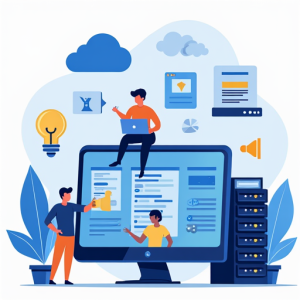It took ChatGPT roughly 60 days to gain 100 million users and this marked the dawn of mainstream AI adoption. Among the various capabilities it has to offer, its programming skills are taking the world by storm. Combining ChatGPT 4’s coding abilities with its ability to interact with users in a natural, conversational tone brings both opportunities and challenges for DevOps professionals and IT managers.
In order to adapt to the changing landscape and make the most of ChatGPT 4’s potential benefits, you must adopt well-thought strategies and best practices. In this article, I will outline the steps that can help DevOps professionals and IT managers thrive in the age of ChatGPT 4.
Let’s get started:
ChatGPT 4: A Brief Overview
Before we dive into its impact on DevOps, let’s first get a bird’s eye view of ChatGPT 4. Developed by OpenAI, it is a cutting-edge AI language model based on Generative Pre-Trained Transformer 4 (GPT 4) architecture and is designed to understand context, generate human-like conversations, and interact with users in a natural way.
How Will ChatGPT 4 Influence DevOps Processes And Workflows
In this section, we will have a look at how ChatGPT 4 will impact the major DevOps functions in the near future:
Code Generation
Undoubtedly, ChatGPT 4 will prove to be a powerful coding aid as it can create functional, cyber security-centric codes even on the basis of high-level descriptions of required features. With each new version, it has improved as an automatic programming technology considerably.
Error Detection and Resolution
Given its coding prowess, ChatGPT 4 can also be used to identify underlying issues in code, logs, or configuration files more efficiently than SDEs. It offers suggestions for fixing errors and even generates patches automatically, which ultimately speeds up the resolution process and minimizes downtime.
On the flip side, its human-like communication abilities can help DevOps teams to understand complex, business-sensitive issues with the code/logic which AI can’t/shouldn’t handle on its own.
Issue Tracking
With API-based integrations, ChatGPT 4 can be used to streamline issue tracking by automatically categorizing and prioritizing issues, as well as suggesting potential solutions or directing them to the appropriate team members.
Documentation
Every DevOps team is required to create and maintain documentation which can be both time-consuming and counterproductive in case of tight deadlines, but ChatGPT 4 can help automate this process by generating documentation from the finalized code or inputs from the DevOps team, ensuring it stays up-to-date and accurate.
Collaboration And Communication
Just like the Development part of DevOps, ChatGPT 4 can enhance the Operations side i.e. collaboration and communication in several ways:
Real-Time Translation
Working with global teams poses language barriers and with the post-pandemic shift towards remote and hybrid work settings, things have been more complicated for DevOps teams.
ChatGPT 4 can play a major role in the process by facilitating better collaboration by acting as an intelligent intermediary between team members. It can offer real-time translations, ensure smooth communication among team members regardless of work environment and reduce other diversity-driven challenges.
Knowledge Sharing
With its vast knowledge base, ChatGPT 4 can serve as a reliable, centralized repository of information, answering questions and providing insights to team members when needed.
This will give DevOps professionals more time to work on tasks that can’t be delegated to AI instead of staying occupied with crucial yet repetitive tasks.
Meeting Summaries
ChatGPT 4 can help keep team members in the loop and stay aligned by smartly summarizing long discussions, and generating meeting notes (MoM).
Thus, ChatGPT 4 has the potential to truly revolutionize DevOps processes and workflows by automating tasks, improving communication, and speeding up error detection and resolution. Therefore, it raises plenty of concerns over issues like job displacement, security, and ethical considerations.
ChatGPT 4-Driven DevOps Job Displacement And Strategies To Secure Your Job
As evident from public discussions and expert opinions, job displacement is one of the most pressing concerns surrounding ChatGPT 4’s impact on DevOps.
While the automation capabilities of ChatGPT 4 can significantly improve efficiency on one hand, on the other hand, they are also likely to render some roles completely obsolete.
Put simply, junior DevOps roles will be severely impacted while the senior team members who don’t specialize in management and work delegation might suffer as well since ChatGPT 4 can support a significant part of their job role. Leaving the extremely skilled, specialist DevOps engineers aside, ChatGPT 4 can emerge as a disruptive force for most DevOps professionals.
New Skill Development For DevOps Professionals
To stay relevant in the face of AI-driven automation, DevOps professionals must focus on upskilling and reskilling. Today, it is necessary to develop skills in domains like AI, machine learning, and data analytics to remain competitive in the job market.
I would strongly recommend developing a strong foundation in AI and machine learning to understand the underlying technologies and their applications in DevOps.
At the same time, you must familiarize yourself with popular data analytics tools and techniques to extract valuable insights from data.
Ultimately, it is essential that you learn to work effectively with AI tools like ChatGPT 4 to stay relevant to evolving needs of the industry and its expected performance benchmarks.
Having said that, I must state that it is natural to get overwhelmed by the apparent implications of such disruptive technologies but you shouldn’t allow it to become a total roadblock.
Instead, staying informed about the latest developments in AI and ChatGPT 4 can help you identify and encash untapped opportunities. Try following the industry news, attending virtual conferences, and engaging with experts to keep up with the developments.
You must also participate in online communities and forums to exchange ideas, share knowledge, learn from your peers’ experiences, and know how they are leveraging ChatGPT 4.
Measures To Be Taken By IT Managers And Organizations That Use ChatGPT 4 To Supercharge DevOps
In this section, we will go through an overview of how DevOps leaders, IT managers, and organizations can approach ChatGPT 4 to safeguard their interests:
Security Concerns: Protecting Sensitive Information
Despite ChatGPT 4’s advanced language generation capabilities, users have flagged issues like giving cyber security invasive answers and providing malignant data which isn’t supposed to be shared with the users.
For DevOps teams, this can be a sizable challenge since it eliminates the ability to grant permissions for information sharing and executing tasks on an account-level basis. Here are some policy-level initiatives you must explore:
Data Access Control
Implement strict access control measures to ensure that only authorized individuals have access to crucial ChatGPT 4 accounts and the sensitive business/product data it processes. This can help prevent unauthorized access or data breaches.
Regular Audits And Monitoring
You must conduct regular audits and monitoring to identify potential security vulnerabilities. Also, make it a point to stay informed about the latest ChatGPT 4 security best practices and ensure your team follows them while using the platform.
Foster A Culture of Innovation
You must encourage experimentation with ChatGPT 4 in your team along with other AI technologies to ensure that your company is at par with the rest of the industry. Support a culture of AI-driven innovation that values creativity, learning, and continuous improvement while upholding human-centric values.
Encourage Cross-Functional Collaboration
Make it a point to promote collaboration between different teams to develop a shared understanding of ChatGPT 4’s potential to boost DevOps and how it can be leveraged across the organization.
Invest In Training And Support
DevOps organizations must include AI technologies like ChatGPT 4 in their learning and development functions. You must provide educational resources to help your employees understand and utilize ChatGPT 4 effectively as it continues to evolve rapidly.
You should also offer ongoing support to facilitate the adoption of new AI technologies, tools, and processes.
Measure Success Metrics And KPIs And Iterate
Apart from the above-mentioned initiatives, it is important that you formally track the impact of ChatGPT 4 implementations on your organization’s performance and processes. It is recommended to use data-driven insights to refine AI utilization strategies and continuously improve results as in the case of any other enterprise-grade software.
Also, establish clear metrics and KPIs on an organizational level to measure the success of ChatGPT 4 use case implementations in DevOps, focusing on efficiency, collaboration, and innovation.
Regularly Review And Adjust
Last but not least, it is in your best interest to regularly review the performance of ChatGPT 4 DevOps use case implementations and adaptations in DevOps and optimize strategies as needed.
Ethical Considerations: Responsible AI Implementation
As evident from the above discussion, the use of AI technologies like ChatGPT 4 will raise ethical concerns, as they can inadvertently perpetuate biases and misinformation. This
Bias Mitigation
OpenAI has time and again highlighted the potential biases in ChatGPT 4’s training data and outputs. Thus, you must implement measures to identify and address biases that will impact your DevOps tasks, processes, and your business at large. It is necessary to ensure that the AI systems align with your organization’s core values and principles.
Transparency And Accountability
Due to apparent concerns shared by customers in general, it is important to maintain transparency around your organization’s use of ChatGPT 4 and its potential implications. Try encouraging open discussions about ethical considerations and fostering a culture of accountability while keeping all stakeholders confidence.
Wrap Up
Remember, ChatGPT 4 is a tool designed to enhance, supplement, and assist human expertise. It should not be considered a full-proof replacement for human intelligence and capabilities. AI technologies like ChatGPT 4 are still in their nascent phase despite seemingly gigantic progress. Hence, you must focus on cultivating uniquely human skills, such as critical thinking, creativity, and emotional intelligence, which are less susceptible to AI-based automation.
As AI continues to disrupt the industry, DevOps job roles will evolve, and professionals who adapt to these changes and develop new, in-demand skills will see an unprecedented rise in compensation. By embracing the opportunities offered by ChatGPT 4 and AI at large, DevOps professionals and IT managers can create a more efficient, collaborative, and innovative future.
Looking for a high TC DevOps opportunity? Join Talent500 and find a secure, well paying DevOps job now!



